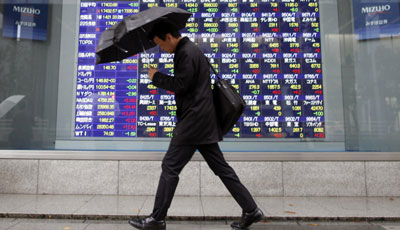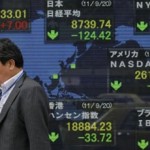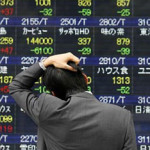Index Futures Drop With Asia Stocks After China GDP; Euro Rises

-
Economy expands 6.9% in third quarter, beating estimates
-
Gold retreats with copper as metals slide in data’s wake
U.S. and European equity-index futures retreated with Asian shares and commodities after China reported the slowest economic growth since 2009. Treasuries fluctuated and the euro strengthened.
The Shanghai Composite Index dropped 0.5 percent as investors weighed whether the 6.9 percent expansion in China’s gross domestic product last quarter — better than economists had estimated, while less than the government’s 7 percent growth goal — would spur additional stimulus. Futures on the Euro Stoxx 50 Index lost 0.3 percent, while contracts on the Standard & Poor’s 500 Index signaled the gauge will retreat after a third weekly gain. South Korea’s won rose to its strongest since July. Treasuries were little changed as the euro climbed. Canada’s dollar slipped ahead of national elections.

“Chinese growth numbers are coming down — that trend will not stop,” said Hartmut Issel, Singapore-based chief investment officer for UBS AG’s wealth management unit.
China was at the centre of last quarter’s global market convulsions, which led to the biggest equity wipeout in four years. Monday’s data showed retail sales expanded more than estimated in September, while industrial production and fixed asset investment slowed by more than economists projected. Stocks around the world have been rallying throughout October, a bounce back that has restored more than $4 trillion to the value of the global equity market.
Stabilization in Chinese stocks along with declining prospects of an imminent increase to Federal Reserve borrowing rates have underpinned the advance, helping to spur a recovery in emerging-market assets and commodities from crude oil to industrial metals. Energy and raw-materials producers have driven the October gains, followed by technology stocks. The European Central Bank will issue a review on monetary policy later this week, with investors focused on any commentary on the outlook for the region’s quantitative-easing program.
Stocks
Futures on the Euro Stoxx 50 Index fell 0.3 percent by 7:20 a.m. in London, while contracts on the FTSE 100 Index slipped 0.2 percent. The MSCI Asia Pacific Index lost 0.4 percent, slipping from its highest level since Aug. 20. The Topix index fell 0.7 percent, paring a drop of as much as 1.1 percent, while the Kospi index in Seoul finished little changed. Australia’s S&P/ASX 200 Index was little changed.
Hong Kong’s Hang Seng Index fell 0.6 percent, while the Hang Seng China Enterprises Index, a gauge of mainland Chinese stocks listed in the city, fell 0.5 percent. The Shanghai Composite swung to a loss after gaining as much as 1 percent. Economists had projected GDP growth of 6.8 percent.
The benchmark index for China’s largest equity venue surged 6.5 percent in the five days through Friday, the steepest weekly gain in four months, as traders speculated the government will accelerate reforms of state-owned companies and loosen monetary policy. The market’s recent rebound continued to lure back investors, with Friday’s turnover jumping to the highest level since Sept. 2 and margin debt capping the longest stretch of gains in two months.
China’s economic resilience comes as a stronger services sector and robust consumption help offset weakness in manufacturing and exports. The government has cut interest rates five times since November and boosted infrastructure spending in recent months to keep growth from sliding too far below this year’s target for about 7 percent.
Futures on the Standard & Poor’s 500 Index dropped 0.3 percent after the U.S. benchmark ended Friday at an eight-week high, capping a weekly advance of 0.9 percent.

“Although there is a lot of skepticism about official releases, markets will continue to follow closely the numbers to get an idea on how far the government is willing to let the deceleration go,” Barclays Plc analysts, including Andres Jaime, a currency and rates strategist in New York, wrote in a client note, referring to Monday’s data out of China. “We see some downside risks for emerging-market currencies in case data disappoint or there are more signs of financial instability in the Chinese markets in the weeks to come.”
Currencies
The won strengthened 0.7 percent to 1,121.14 a dollar, after earlier weakening as much as 0.3 percent, data compiled by Bloomberg show. It touched 1,120.99, the strongest since July 3. The currency has gained 5.7 percent this month, the best performance in Asia after Indonesia’s rupiah, as speculation eased that the U.S. will raise interest rates in 2015. Expansion in South Korea is expected to have quickened in the third quarter, economists predict before data due Friday.
“There were concerns about slower growth in China affecting regional economies and today’s headline number helped calm these,” said Hong Seok Chan, a currency analyst at Daishin Economic Research Institute in Seoul. “That puts upward pressure on the won.”
Australia’s dollar traded little changed at 72.66 U.S. cents, erasing a drop of as much as 0.3 percent to 72.39 cents. China’s offshore yuan pared losses after the data.
Malaysia’s ringgit fell to a one-week low ahead of Friday’s budget as investors focus on what measures the government will take to shore up the economy amid a collapse in commodities and slowing global growth.
Commodities
The Bloomberg Commodity Index slipped 0.5 percent. The measure has risen about 5 percent since hitting a 16-year low in August.
Gold for immediate delivery slipped 0.4 percent to $1,172.45 per ounce after increasing 1.8 percent last week. Monday’s decline follows a private report on Friday that showed U.S. consumer sentiment rose more than forecast this month and government data Thursday that showed jobless claims unexpectedly slid to match the fewest in four decades.
Copper retreated 0.7 percent to $5,248 a metric ton after falling as much as 1 percent before China released its economic data. Nickel dropped 1.3 percent.
West Texas Intermediate crude oil slipped 0.7 percent to $46.92 a barrel, while Brent in London retreated 0.6 percent to $50.14 a barrel.
Source: Bloomberg – Index Futures Drop With Asia Stocks After China GDP; Euro Rises





























